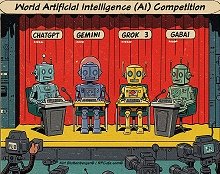Electronics Pioneers & History
- See Full List of AI Topics -
 J. Robert Oppenheimer (1904-1967) was an American theoretical physicist and one
of the key scientists involved in the development of the atomic bomb during World
War II. He was born in New York City and studied at Harvard University and the University
of Cambridge before joining the faculty at the University of California, Berkeley. J. Robert Oppenheimer (1904-1967) was an American theoretical physicist and one
of the key scientists involved in the development of the atomic bomb during World
War II. He was born in New York City and studied at Harvard University and the University
of Cambridge before joining the faculty at the University of California, Berkeley.
During World War II, Oppenheimer was recruited to work on the Manhattan Project,
a top-secret U.S. government program to develop the first nuclear weapons. As the
director of the Los Alamos Laboratory, he oversaw the design and testing of the
bomb, which was eventually dropped on the Japanese cities of Hiroshima and Nagasaki,
leading to Japan's surrender and the end of the war.
Oppenheimer's contributions to the field of physics were numerous and included
groundbreaking work in quantum mechanics, cosmology, and nuclear physics. He was
widely regarded as one of the preeminent physicists of his time and played a central
role in the development of the atomic bomb.
After the war, Oppenheimer became an outspoken opponent of the nuclear arms race
and a leading advocate for arms control and disarmament. He was also involved in
the development of the hydrogen bomb, but later came to regret his involvement in
its creation.
Oppenheimer's political views and associations came under scrutiny during the
anti-communist fervor of the 1950s, and he was ultimately stripped of his security
clearance by the U.S. government. He continued to teach and conduct research, but
his reputation as a scientist was tarnished by the controversy surrounding his security
clearance. Oppenheimer died of throat cancer in 1967.
Robert Oppenheimer was awarded the Fermi Award in 1963 for his contributions
to theoretical physics and his leadership of the Manhattan Project during World
War II. The award citation recognized Oppenheimer's "outstanding contributions to
theoretical physics" and his "leadership and creativity" in directing the development
of the first atomic bomb.
 This content was generated by primarily
with the assistance of ChatGPT (OpenAI), and/or
Gemini (Google), and/or
Arya (GabAI), and/or Grok
(x.AI), and/or DeepSeek artificial intelligence
(AI) engines. Review was performed to help detect and correct any inaccuracies; however,
you are encouraged to verify the information yourself if it will be used for critical
applications. In all cases, multiple solicitations to the AI engine(s) was(were)
used to assimilate final content. Images and external hyperlinks have also been
added occasionally - especially on extensive treatises. Courts have ruled that AI-generated
content is not subject to copyright restrictions, but since I modify them, everything
here is protected by RF Cafe copyright. Many of the images are likewise generated
and modified. Your use of this data implies an agreement to hold totally harmless
Kirt Blattenberger, RF Cafe, and any and all of its assigns. Thank you. Here is
Gab AI in an iFrame. This content was generated by primarily
with the assistance of ChatGPT (OpenAI), and/or
Gemini (Google), and/or
Arya (GabAI), and/or Grok
(x.AI), and/or DeepSeek artificial intelligence
(AI) engines. Review was performed to help detect and correct any inaccuracies; however,
you are encouraged to verify the information yourself if it will be used for critical
applications. In all cases, multiple solicitations to the AI engine(s) was(were)
used to assimilate final content. Images and external hyperlinks have also been
added occasionally - especially on extensive treatises. Courts have ruled that AI-generated
content is not subject to copyright restrictions, but since I modify them, everything
here is protected by RF Cafe copyright. Many of the images are likewise generated
and modified. Your use of this data implies an agreement to hold totally harmless
Kirt Blattenberger, RF Cafe, and any and all of its assigns. Thank you. Here is
Gab AI in an iFrame.
AI Technical Trustability Update
While working on an update to my
RF Cafe Espresso Engineering Workbook project to add a couple calculators about
FM sidebands (available soon). The good news is that AI provided excellent VBA code
to generate a set of Bessel function
plots. The bad news is when I asked for a
table
showing at which modulation indices sidebands 0 (carrier) through 5 vanish,
none of the agents got it right. Some were really bad. The AI agents typically explain
their reason and method correctly, then go on to produces bad results. Even after
pointing out errors, subsequent results are still wrong. I do a lot of AI work
and see this often, even with subscribing to professional versions. I ultimately
generated the table myself. There is going to be a lot of inaccurate information
out there based on unverified AI queries, so beware.
Electronics & High Tech
Companies | Electronics &
Tech Publications | Electronics &
Tech Pioneers | Electronics &
Tech Principles |
Tech Standards Groups &
Industry Associations | Societal
Influences on Technology
|



 J. Robert Oppenheimer (1904-1967) was an American theoretical physicist and one
of the key scientists involved in the development of the atomic bomb during World
War II. He was born in New York City and studied at Harvard University and the University
of Cambridge before joining the faculty at the University of California, Berkeley.
J. Robert Oppenheimer (1904-1967) was an American theoretical physicist and one
of the key scientists involved in the development of the atomic bomb during World
War II. He was born in New York City and studied at Harvard University and the University
of Cambridge before joining the faculty at the University of California, Berkeley.




